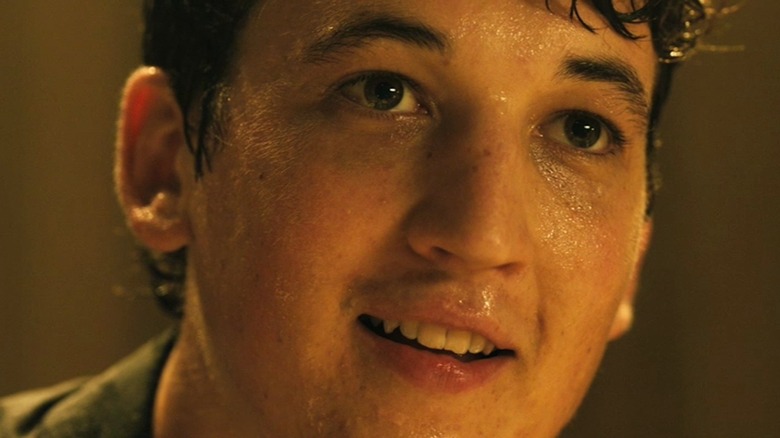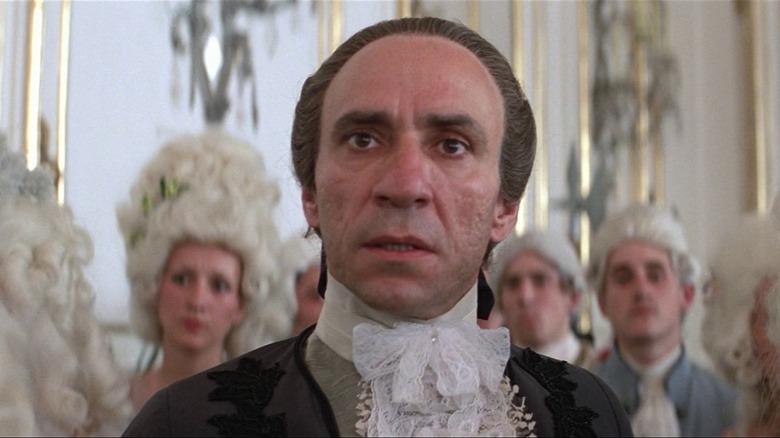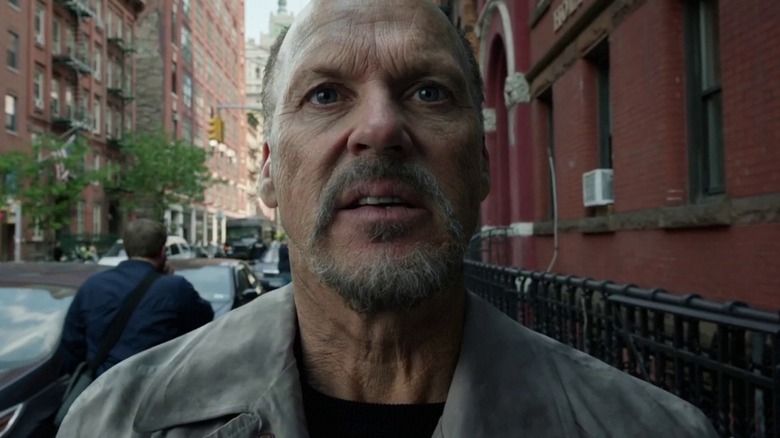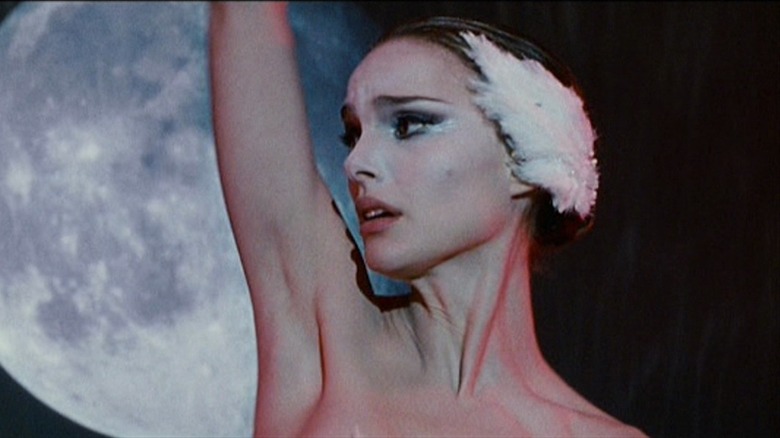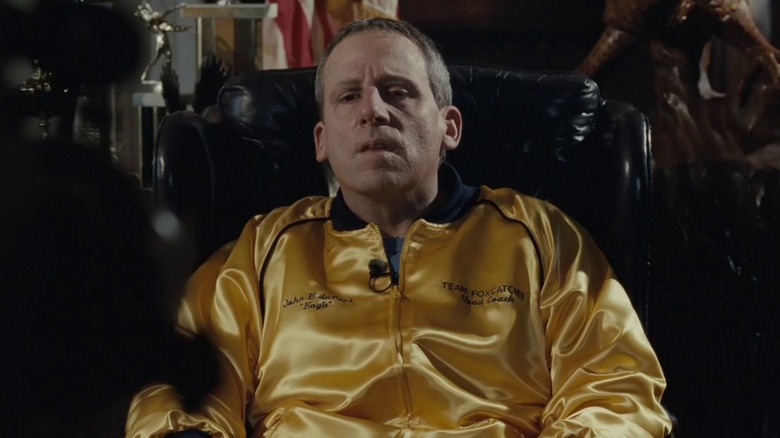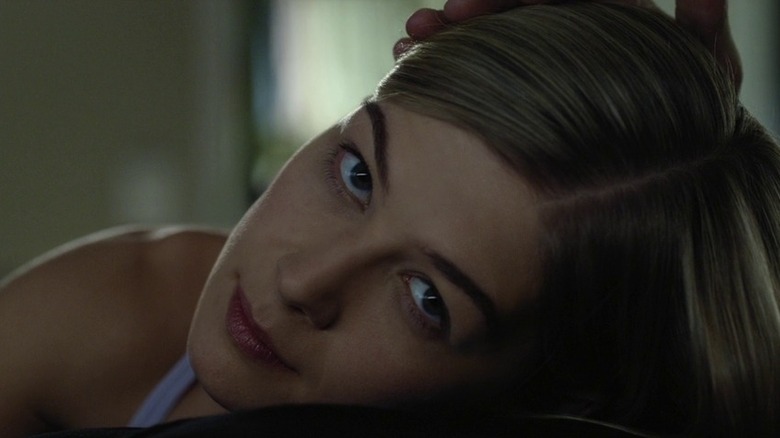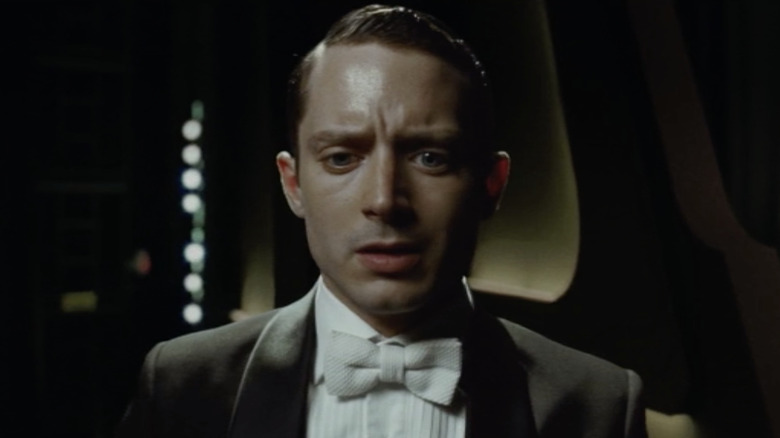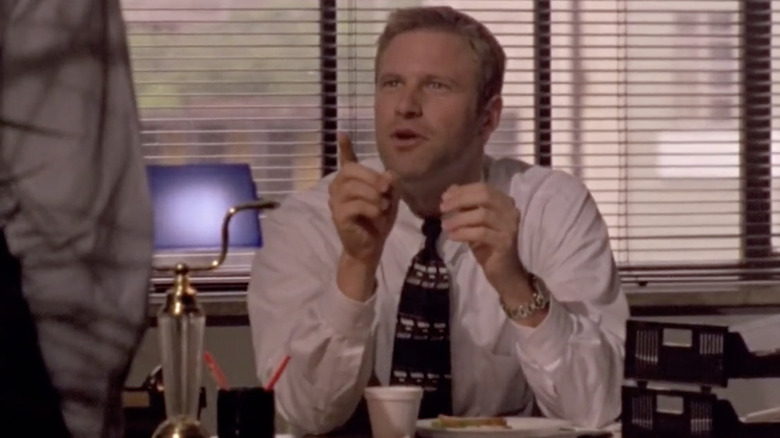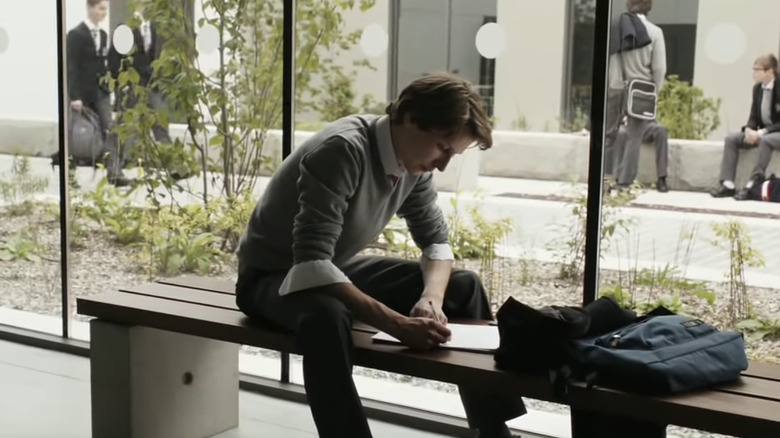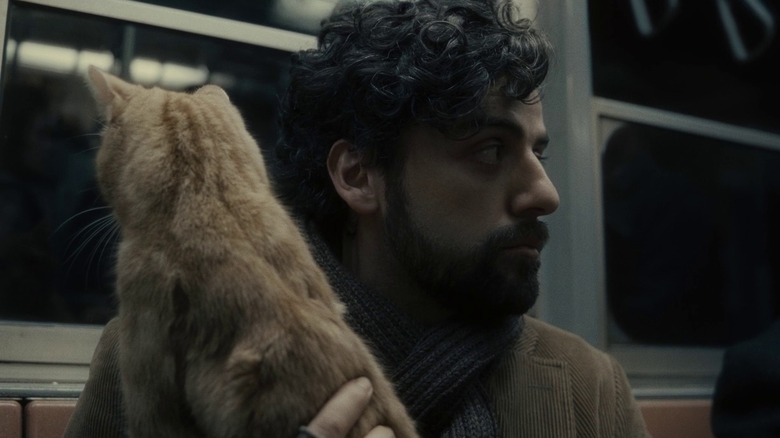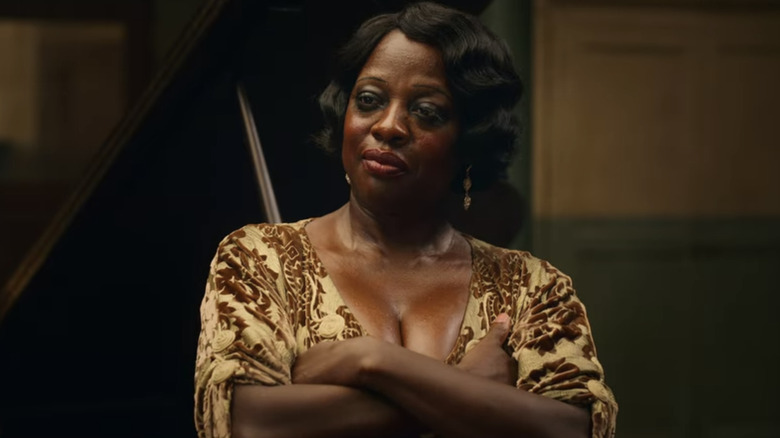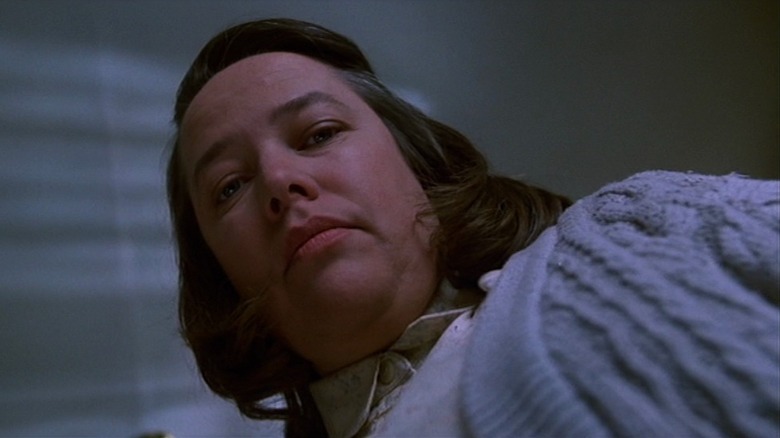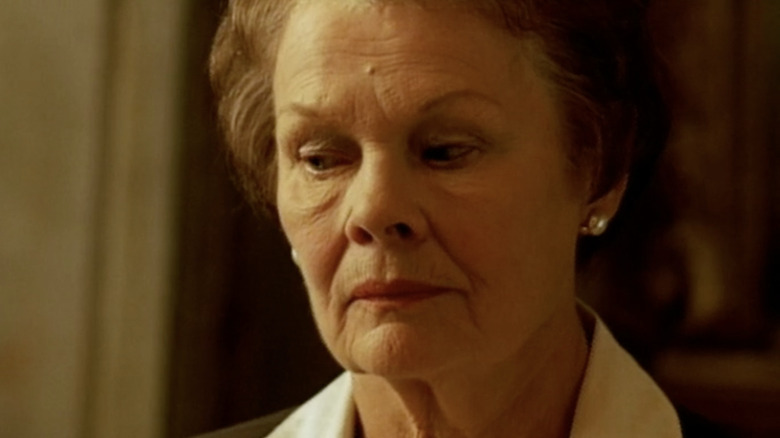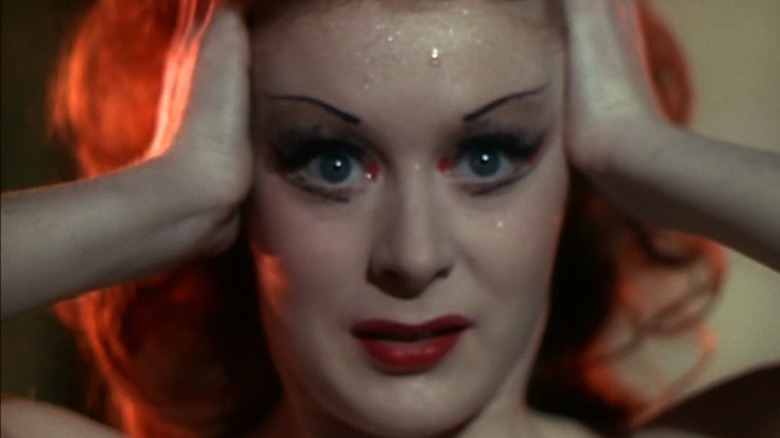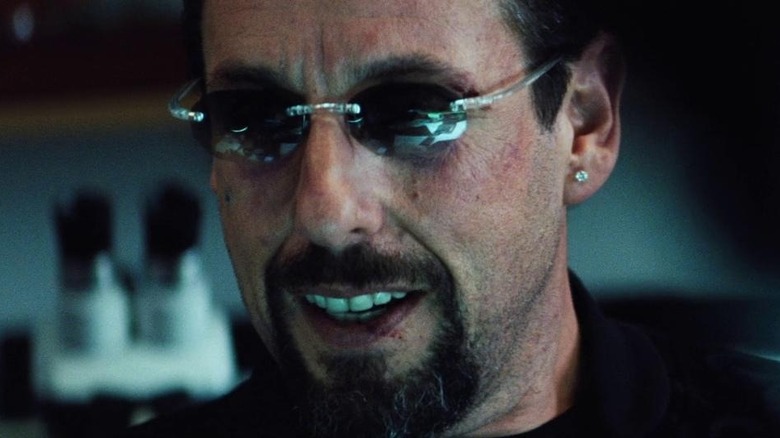14 Movies Like Whiplash That Drama Fans Need To See
We can think of lots of movies that are intense, but few deserve that label as much as "Whiplash," which hits so hard that it feels like an attack. With challenging themes about what it takes to achieve and refine genius, blistering verbal abuse, and a toxic but radiant shared obsession, the film pushes viewers to their limits. Once it's over, you have to catch your breath. Part of the intensity comes from verisimilitude; writer/director Damien Chazelle was once a drummer in a well-regarded high school jazz band led by a passionate instructor. There's just no way to get this one out of your head.
We've thought long and hard about all the different qualities that make "Whiplash" leave such an indelible impression. The 14 movies below take a lot of different approaches, but they all channel part of what makes "Whiplash" great — and they all add their own unique strengths to the mix. We promise that, short of having J.K. Simmons show up in your living room to scream at you, this is the closest you can get to more "Whiplash."
Amadeus
Any good movie about musical greatness and warped connections will inevitably get compared to "Amadeus," which offers up dazzling displays of both bitterness and brio. "Whiplash" lives up to its predecessor's reputation — and vice versa.
"Amadeus" is a rich — if thoroughly fictionalized, per this Guardian article — dual biopic of classical composers Mozart (Tom Hulce) and Salieri (F. Murray Abraham). The devout, chaste Salieri spends years believing that his considerable talent and success come straight from God: They're his reward for upright behavior. Then he meets Mozart, and the ideas he's built his life on crumble. Mozart is gauche, crude, irritating ... and so sublimely, supremely gifted that Salieri looks mediocre in comparison. Salieri can't handle it. He devotes himself to taking Mozart down, even if he has to resort to sabotage and murder, destroying his piety in the process.
The movie was an acclaimed success, sweeping the Oscars: It won eight, including Best Picture, Best Director, and Best Actor in a Leading Role. In 1998, The American Film Institute ranked it no. 53 on a list of the 100 Greatest American Movies of All Time. This is one for the ages, and it's definitely part of the same family tree as "Whiplash."
Birdman
Filmed to look like one long, unbroken take, "Birdman" builds up to a boil — maybe even an explosion. Michael Keaton's Riggan Thomson is a one-time blockbuster star, a superhero gone to seed. Now, late in his career, he wants to use a new Broadway play to reclaim a tiny bit of fame and a sense of artistic seriousness.
But the road to opening night is bumpy both personally and professionally, and we can just see the fuse on this powderkeg slowly burning down. From his estranged daughter (Emma Stone) to his temperamental and egotistical new co-star (Edward Norton) to a venomous critic (Lindsay Duncan), Riggan is surrounded by volatile people with whom he can't connect. On top of all that, he's hearing his old character's (the titular Birdman's) voice in his head. It isn't just Riggan's reputation on the line here: It's his sanity.
With all that in mind, "Birdman" builds to a powerful climax and a memorable final scene, just like "Whiplash" (albeit with more CGI). It's a high-pressure, introspective, and sometimes nightmarish exploration of the unpredictability of art — and the foibles and egos of the people who bring it to life.
Black Swan
In "Black Swan," the pursuit of balletic perfection puts the shy, emotionally brittle Nina Sayers (Natalie Portman) through the wringer. When she gets the coveted lead role in an upcoming production of "Swan Lake," it seems like all her suffering is finally paying off. But channeling the sensual and volatile Black Swan is still a struggle, and her efforts begin to take an almost hallucinatory toll. Ballet famously mutilates dancers' feet, but the physical damage Nina takes starts getting stranger: She seems to be growing feathers.
Nina's losing her hold on reality. But can we blame her? The ballet studio is a hothouse of envy and competition, her director (played by a creepy, predatory Vincent Cassel) keeps her constantly on edge, and her mother tries to control her at every moment. Dancing empowers her and lets her escape into artistic fulfillment. Like Andrew in "Whiplash," she's ultimately willing to go through all the pain if she can achieve the performance of a lifetime and a moment of pure transcendence.
Foxcatcher
Like "Whiplash," 2014's grim "Foxcatcher" straddles the line between drama and thriller, crafting a gripping narrative that always feels one confrontation away from erupting into violence. If you're familiar with the events "Foxcatcher" is based on, the tension is even worse. You know what's coming, but somehow the film still feels edgy and unpredictable.
This is the story of a major wrestling team owned by the wealthy and unstable John du Pont (an almost unrecognizable Steve Carell). Du Pont recruits two former Olympic champions, brothers Mark (Channing Tatum) and Dave Schultz (Mark Ruffalo). At first, only Mark can take him up on the offer — and since he's always felt like a lesser copy of his more put-together, traditionally successful brother, he likes the chance to be the one in the spotlight. He blossoms under Du Pont's attention, even when it comes with a new and troubling cocaine addiction. But Du Pont has his own demons to contend with, and when they get stirred up, he turns on Mark and sends him on a downward spiral. Dave may be his only way out. It all results in a messy, fraught triangle of competition, need, and control.
Gone Girl
When it comes to twisted tangos of manipulation, toxic relationships, and psychological warfare, you want 2014's "Gone Girl." Do a double-feature with "Whiplash," and the question of what it takes to make good music changes into something that hits even closer to home: What does it take to make a good marriage?
Superficially, whatever it is, Nick and Amy Dunne have it. Played by Ben Affleck and Rosamund Pike, they certainly make a beautiful couple. They have all the right accessories: a luxurious house, a picture-perfect courtship, and even lovely anniversary traditions. But when Amy goes missing, the police and media turn the Dunnes' life together into an open book, revealing that just below the polished surface is a dark and twisted story full of adultery, deception, betrayal, and violence. As the gulf between the truth and the appearance widens, "Gone Girl" offers a sharp, incisive look at how often relationships come down to performance — and how important it can be to pull those performances off.
Grand Piano
"Whiplash" director Damien Chazelle also scripted an earlier music-centric movie, 2013's "Grand Piano." It's more of a straightforward thriller: Think of it as all the most stressful "Whiplash" scenes packed into one.
Years before the movie begins, pianist Tom Selznick (Elijah Wood) infamously succumbs to an attack of stage fright while playing his mentor Patrick Godureaux's most difficult and nerve-racking composition, "La Cinquette." Now he has the chance for a high-stakes comeback at a memorial concert held in Godureaux's honor. It's a make-or-break career opportunity that soon takes an unexpected twist: A mysterious gunman (John Cusack) instructs Tom to reprise "La Cinquette" and get it right this time. One wrong note and he gets a bullet in his head.
Stuck at the end of a gunsight, Tom has to try for perfection and find a clever solution to this bizarre hostage situation. The scenario may be far-fetched — musicians can be eccentric, sure, but how many of them really build elaborate puzzle-boxes inside grand pianos to hide their fortunes, as Godureaux does? — but it's also a lot of fun. And let's face it, if J.K. Simmons' Terence Fletcher had the chance to make someone drum at gunpoint, he'd totally take it.
In the Company of Men
Tightly written, darkly funny, and full of energy, "In the Company of Men" is a must-see for "Whiplash" fans who are fascinated by Terence Fletcher's power games and cruelty. Sometimes a movie's unrepentant bad guy is also its most vivid character.
Here, that's Chad (Aaron Eckhart). Our main character might technically be Matt Malloy's Howard, who has more of a conscience and far fewer schemes, but Chad is the confident devil on the weaker Howard's shoulder. He's the one who really spearheads the awful plan the two of them concoct to seduce a vulnerable woman and break up with her at the same time, just to devastate her. They target Christine (Stacy Edwards), a shy coworker who is insecure about being deaf. It's an astonishingly mean-spirited project, and agreeing to it — and just having Chad around, plain and simple — ultimately makes Howard's life fall apart. The game these two men are playing isn't a team sport after all. It's a sick competition, and Howard is losing.
Time Out called the film "cruel, cool and pleasingly provocative," and those qualities make it a perfect match for "Whiplash." It leaves you appalled ... but also enthralled.
In the House
In the struggle between teacher and student, sometimes it's the student who gets the upper hand. That's what happens in the darkly comedic and always surprising French film "In the House," where creative writing lessons wind up crossing all kinds of ethical lines.
Literature teacher Germain (Fabrice Luchini) gets reluctantly drawn into the voyeuristic, unnerving stories his precocious student Claude (Ernst Umhauer) writes about his gradual infiltration of a friend's house. The writing is good, and its suspense and unease are especially irresistible. But the way Claude toys with the line between reality and fiction is enough to make anyone nervous, and it certainly should give his teacher some cause for concern. Still, the flimsy fictionalization lets Germain pretend that he's truly convinced this is all only make-believe. He can edit Claude's story, but what effect is he having on the real world?
Issues of responsibility, morality, literature, and class all intersect in this sly movie. It may be lighter than "Whiplash," but it definitely has the same spark. The Guardian sums it all up nicely: "Pupil and teacher, as both seducer and seduced, enter into a form of conspiracy. ... The results are extremely funny in the account of a folie à deux in the dangerous world of teaching, and perceptive in the observation of the creative process." The insights it offers are sharp enough to draw blood.
Inside Llewyn Davis
There's no rule that says only good people make good artists. In "Whiplash," Terence Fletcher pushes well past the "tough love" line and all the way into actual abuse as he "instructs" his students — but we don't for a second doubt that he knows musical greatness just as well as he says he does.
The Coen Brothers' "Inside Llewyn Davis" gives us a protagonist who isn't that monstrous, but Oscar Isaac's brooding Llewyn, a gifted folk singer, is still someone you'd probably want to cut out of your life. For all his talent — when he sings "Fare Thee Well," it's hard not to feel the same ache he does — he's a selfish user who drifts through life making one mistake after the other and alienating almost everyone he comes into contact with. The film quietly suggests that the one good relationship he might have had was with Mike, his old partner. Sadly, his ongoing grief over Mike's death seems to make him even more determined to push everyone else away.
Ultimately, "Inside Llewyn Davis" gives us a more compassionate portrait of the artist as a lousy human being. As badly as Llewyn treats the people in his life, we can't help but feel for him. It's harder to manage the same kind of sympathy for Fletcher.
Ma Rainey's Black Bottom
"Ma Rainey's Black Bottom" looks at a later stage of a musician's life, after they already have the necessary confidence and greatness. When you have the performance down, what happens with the business?
In "Ma Rainey's Black Bottom," the musicians in question also have to deal with the pervasive racism of the 1920s: Whatever power they can get through their musical prowess, they want to keep, especially since they've had to make compromises to get it. Viola Davis' Ma Rainey is at the height of her fame here, an established star more than willing to be "difficult" in order to get her way. Mirroring her is Chadwick Boseman in a final, awe-inspiring role: ambitious up-and-comer Levee Green, who has nothing but his drive, anger, and ferocious talent.
Set mostly in one swelteringly hot location with tensions running unbelievably high, "Ma Rainey's Black Bottom" is a high-octane film led by two powerhouse performers. It also has a brutality "Whiplash" fans will recognize. Justin Chang at The LA Times said, "One of [the original playwright's] cruelest insights is that his characters, trapped together in close quarters, will turn on each other with an almost cannibalistic fury, channeling their justifiable rage in the wrong direction." Fortunately for us, the damage they do is riveting.
Misery
"Misery" may be the most iconic film about putting someone through hell in the name of art. Take the tension of "Whiplash" and ratchet it up into pure, unadulterated terror, and you have "Misery."
This is the story of famed author Paul Sheldon (James Caan), who has made a living churning out pulp novels about the adventures of the excellently named Misery Chastain. The Misery books sell like hotcakes, but they all have Fabio-style clinch covers. They're never going to get Paul the literary reputation he craves. So he's decided to put the series behind him for good. He's killed Misery. He even has a completed draft of a new novel, one that could completely reshape his career.
His life is on track right until he gets in a car crash and meets his "no. 1 fan," reclusive nurse Annie Wilkes (Kathy Bates). Annie takes wonderful care of the severely injured Paul. Sure, she keeps him imprisoned in her spare bedroom, but he would have to be so ungrateful to mind that, wouldn't he? She just has one demand: Bring Misery back. Now, held hostage by a woman whose moods swing as unpredictably as her sledgehammer, Paul has to write for his life. It's any artist's worst nightmare, but it's also one of the best and most gripping horror movies ever.
Notes on a Scandal
"Notes on a Scandal" offers a small-scale but deeply disturbing portrait of human connections gone wrong. Judi Dench stars as Barbara Covett, an embittered history teacher with a past pattern of obsession and manipulation. She wants to befriend new teacher Sheba Hart (Cate Blanchett), but when she finds out that Sheba is having an affair with one of her students, she has no problem tainting their budding closeness with a spot of emotional blackmail. What's a little twisting of the knife between friends?
What Sheba does is clearly wrong, but our look inside Barbara's mind shows exactly how poisonous she is: She doesn't care about the student's well-being or even morality in general. She only cares about leverage. She doesn't want to be alone, and if she can ruin Sheba's life just enough, Sheba will have no one to turn to but her.
Vicious, clever, and perfectly acted, "Notes on a Scandal" is a suffocating dive into the dark side of human nature.
The Red Shoes
"The Red Shoes" is a masterpiece. When it comes to stories of artistic fervor and ruinous obsession, it rarely gets any better than this. If you're looking for some follow-up viewing for "Whiplash," just remember that you can't go wrong with a classic.
Vicky (Moira Shearer) is a young ballet dancer whose rare gifts quickly shine through. She attracts the attention of two men: the loyal composer Julian (Marius Goring), who loves her, and the brilliant impresario, Lermontov (Anton Walbrook), who loves her talent. Lermontov has shaped his ballet company around Vicky, and he won't tolerate her divided attention or his implicit competition with Julian. When he pushes Vicky to choose between him and Julian — effectively between romance and her career — she chooses Julian and the potential for a happy, ordinary life. But no one with her kind of passion can really leave their vocation behind forever. The emotional tumult of it all, embodied through restless, hallucinatory dance sequences and the collision of fantasy and reality, could destroy her.
"The Red Shoes" asks some of the same questions as "Whiplash," and it also doesn't give us any sure answers. The ambiguity and intensity make these films unforgettable.
Uncut Gems
If what you love about "Whiplash" is its relentless sense of pressure, then you have to pick up "Uncut Gems." This 2019 Safdie Brothers film, starring Adam Sandler in an incredible and ego-free performance, offers 135 minutes of breathless, agonizing stress.
Sandler plays Howard Ratner, a jewelry store owner with a serious gambling problem. Howard lives on the edge, constantly involving himself in high-stakes juggling acts that have him moving from one hustle and potentially ruinous risk to the next. He's pinned a lot of his hopes on auctioning off a black opal, but things keep going wrong. Like any good tragic hero, he also can't stop making his own problems worse. Every time he gets the money to start paying off his massive debt, he turns around and bets it on the chance for an even bigger score. You white-knuckle your way through this movie, invested in Howard's fate even as you watch him constantly flirt with torpedoing it.
We know it sounds hard to get through, but it's also what makes the film so memorable and such a good companion piece for "Whiplash." As IndieWire puts it, it's "a riveting high-wire act, pairing cosmic visuals with the gritty energy of a dark psychological thriller and sudden bursts of frantic comedy ... [that] leaves people rattled, disoriented, grasping for clarity." And the relief won't come until the credits roll.
